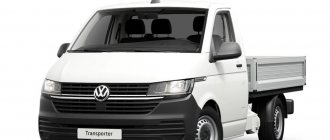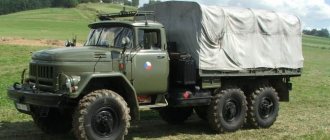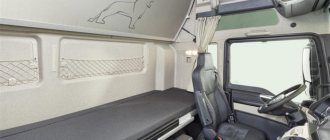The reliability and service life of the Volkswagen Transporter T4 and T5 diesel engines with a displacement of 2.5 are significantly different and depend on the design features of the engines. If the T4 block is made of cast iron, then T5 is aluminum. As a result, the resource of the first differs significantly from the second in the direction of increase, as well as maintainability and the cost of repairs.
Official data (l/100 km)
| Engine | Consumption (city) | Consumption (highway) | Flow (mixed) |
| 1.9 MT diesel (manual) | — | — | 7.5 |
| 2.0 AT petrol (automatic) | 13.2 | 7.8 | 9.8 |
| 2.0 MT petrol (manual) | 12.8 | 7.8 | 9.6 |
| 2.0 AMT petrol (robot) | 13.2 | 7.8 | 9.8 |
| 2.0 AT diesel (automatic) | 10.0 | 6.7 | 7.9 |
| 2.0 MT diesel (manual) | 7.9 | 6.0 | 6.7 |
| 2.0 AMT diesel (robot) | 7.2 | 5.8 | 6.3 |
| 2.4 MT diesel (manual) | — | — | 9.2 |
| 2.5 MT diesel (manual) | — | — | 8.3 |
| 2.5 MT petrol (manual) | — | — | 12.6 |
| 3.2 MT petrol (manual) | — | — | 12.7 |
Volkswagen Transporter T5
The fifth generation Transporter appeared in 2003 and is still in production without any significant changes. The new model has received a modified line of power units - now only two petrol engines are available, 2.0 and 3.2 liters, and all others - three turbocharged diesel engines with a volume of 1.9, 2.0 and 2.5 liters. Transmission options have also changed: 5- and 6-speed manuals are complemented by a 6-speed automatic transmission and a 7-speed robot in top trim levels.
Source: avtozhor.com
T4
Like many cars, the Volkswagen Transporter is equipped with gasoline and diesel units. In the 1990 version (T4), the first ones started with a 2.0 unit with a power rating of 84 horsepower. It was controlled by a manual transmission with five gears. Fuel consumption per 100 km according to the passport was 11.1 liters. Next came the 2.5, with a peak of 115 horsepower. There was already an automatic transmission with four operating modes, as well as all-wheel drive. Its gasoline consumption is 12.5 liters.
The 2.8-liter device could boast 140 horses with a manual transmission and 204 with an automatic transmission. The average consumption here was 13.2 liters. Engines that consumed diesel started with version 1.9, developing 60 or 68 horsepower. It consumed 9.1 liters of fuel. It is also equipped with a two-liter engine, producing 84 horsepower. Its consumption rate is 9.3 l. The largest unit was considered to be 2.5, with a herd of 102 horses. It could also be all-wheel drive. This herd ate 7.6 liters of diesel. Here all the configurations were only manual.
“Like almost everything, my T4 Transporter was purchased for work needs. The truck was too big for me, but the van was just right. I dug it in 2015, although the car is 95. But even years do not affect its performance; it is indestructible. The consumption is just too high - almost 17 liters in the city,” wrote Zakhar from Krasnodar.
“I have been delivering large cargo for a very long time. I tried a lot of different options, but I was only hooked on this one – a comfortable and reliable Transporter. The car lasts for years. Mine was purchased fifteen years ago and there are still no complaints about its performance. Consumption only increased slightly from 13 to 15 liters in the city. But you can fill in any fuel, so this didn’t really affect the spending of money,” writes Rustam from Grozny.
Volkswagen Transporter T4, T5 fuel consumption 1.9, 2.4, 2.5 diesel and gasoline
Production of the Transporter model began in 1950. Then the minivan was produced under the name T1. The most successful and best-selling models were the T4 and T5. They have an original modern design and fairly good technical equipment, and most importantly, they are affordable. VW T4 was produced from 1990 to 2003. During this period, the car underwent restyling and changed the generation of engines. Maximum speed is up to 162 km/h. Issue T5 went on sale in 2004. Maximum speed is 188 km/h. Although the brand new T6 has already appeared in showrooms, the fifth model has not yet rolled off the assembly line.
Volkswagen Transporter T4
In 1990, the car was launched with 1.8, 2.0, 2.5 liter petrol engines and 1.9, 1.9TDI and 2.4 liter diesel engines. Later in 1996, a gasoline 2.8 and 2.5 turbodiesel appeared, which replaced the two previous diesel engines. Average consumption in the mixed cycle is from 7.7 liters to 12.6 liters on the most “charged” version.
Real fuel consumption
- Vladimir, Moscow. VW T4 2000 2.4d. The car is in excellent condition for its age. Naturally, some parts were replaced, but it still runs without problems. Easy to drive, holds the road well. Fuel consumption in the city is 13 liters in the city and 10.5 liters on the highway.
- Alexey, Tver. I have been driving a 2000 Transporter T4 for the sixth year now. The engine is 1.9d. The car is for work and in principle I am happy with it. Sometimes there is a little lack of power when loaded, but it goes quite briskly. Good driving position with full visibility. Consumption is small: in the city from 8 to 11 liters. On the highway, if you drive no higher than 90 km/h, then you can easily manage 7 liters.
- Victor, Novosibirsk. I bought the T4 for work, like many others, probably. Model 1995, 2.5 petrol engine. It rides well, holds up well on wet roads and slush. I didn’t take diesel only because it’s often cold and problems can arise. Fuel consumption is not scary, because the car is unpretentious - it runs smoothly at 92 and even at 86. Consumption in the city is 13-14 liters in the city and 10 liters on the highway.
- Alexander, Kaliningrad. Volkswagen T4 1997 2.5 petrol. I have been working in transportation for 10 years. I’ve been driving similar cars for a long time, but for a long time I heard positive reviews about the T4 and so I decided to buy it. An excellent minivan, despite its “advanced” age. It drives great, has a good view, and is simple in size. Fuel consumption in the city is about 12 liters, on the highway – 9.5 liters.
- Peter, Tyumen. In 2008, I bought a 1998 T4 and still drive it. The car was completely redone. I am engaged in passenger transportation and often go outdoors with friends. I replaced all the seats, reupholstered the interior, repainted the body, and overall the result was a new van. Fuel consumption is very low - 8.5-9 liters in the city, 7 liters on the highway. I have a 1.9d diesel with 68 hp.
- Sergey, Tikhoretsk. I've been driving a wonderful T4 98 car for 3 years now. There is no turbine, but all-wheel drive does a great job of it. Diesel engine 2.4 liters, power 78 hp. enough, behaves excellent off-road. True, if you drive through puddles and the water gets just above the threshold, the traction will drop. Fuel consumption in the city is 13 liters, on the highway 10 liters.
- Pasha, Voronezh. Volkswagen T4 1.9d. I needed an inexpensive but reliable all-wheel drive minivan for work, and all my friends recommended only VW. I'm happy with the car and thank everyone for the good advice. Fuel consumption is ridiculous for such a car, in the city from 6 to 8 liters per 100 km. Model of the 94th year of release.
- Philip, Samara. I've been driving this minivan since 2005. VW T4 1991 1.9 MT. At that time there was an urgent need to purchase a van. Almost without thinking, I took what was closest. It turned out to be a Volkswagen T4. I’ve been driving for 10 years, so it’s not difficult to understand that I’m 100% happy with the car. Diesel fuel consumption is low - in the city it’s within 10 liters, and on average it’s 8.5 liters per hundred square meters.
- Yakov, Krymsk. Owned a 7 year old 1991 Transporter 1.9TDI SUV. When I decided to sell, a buyer was found within a day. I bought a Vito as a replacement, but I regret it a little, since the fuel consumption of the leaker was less: only 8.5 liters in the city and 7 liters of diesel on the highway.
- Sergey, Kamensk. I've been driving a T4 not too long ago. I got a used 1998 model, a 2.0-liter gasoline engine with a manual transmission. The car is excellent, peppy. All-wheel drive copes well with dirt roads and off-road conditions. Often you have to load it with luggage, but the seating position does not change. Fuel consumption was a pleasant surprise: on the highway 8 liters, in the city up to 13 liters maximum.
Volkswagen Transporter T5
Fuel consumption rate per 100 km
T5 diesel engines are equipped with a turbocharger - a pump, due to which fuel injection is reduced and consumption is reduced. An engine with a volume of 2.5 liters has been added to the line of diesel engines. Variations of the remaining power plants did not change until 2012, they added a little power and a 3.2-liter appeared in the maximum configuration. Average fuel consumption: from 7.3 to 13.3 liters per 100 km.
Source: avtobak.net
T5
The fifth generation of the car (T5) was released in 2003. Diesel options here are represented by 1.9 (102 horsepower) and 2.5 (131 and 174 horsepower) units. The first was paired with only a manual transmission variation, but with the second both were available, as was all-wheel drive. Fuel consumption varied from 7.7 to 9.4 liters. There were two representatives for gasoline trim levels: 2.0 (manual, 115 horsepower) and 3.2 (235 horsepower, both gearboxes and all-wheel drive). Their consumption was 10.7 and 12.9 liters.
“The car was driven straight from home. I had to invest a little in the interior, because in some unknown way it was all tattered. This is a pretty good truck, suitable for many tasks. The consumption is normal, 13 liters, no more,” said Dmitry from Kostroma.
“After my company grew, I had to deliver cargo on a larger scale, and since it was expensive to pay for it, I decided to buy a diesel-powered Transporter. I don’t need a lot of power, but I managed to save a lot on consumption – usually it comes out to 9 liters,” said Yuri from St. Petersburg.
Engines
Minivans of almost any generation are distinguished by a large selection of engines that have good potential and low fuel consumption. Gasoline models are considered less reliable than diesel ones. Although there are many disputes with diesel engines, some note that they are not the most successful, while other experts claim that the engines are ideal.
It is the Volkswagen Transporter with diesel fuel that remains the most popular in the secondary market. They are not whimsical, have low fuel consumption, are designed simply, due to which they rarely fail. In addition, they are repairable.
Restyling (2009)
Equipment options have changed significantly after restyling in 2009. Now only one engine is installed - two liters. In the petrol version it produces 150 or 204 power. For the first case, only a manual transmission is available, operating in six modes, and for the second, an automatic transmission is also available, which already has seven gears and all-wheel drive. The average consumption of the configuration is 10.5 liters.
The diesel engine boasts 140 or 180 horsepower, as well as both gearboxes and all-wheel drive in all variants. 7.7 liters of fuel were consumed here.
“Before this model, I used the previous generation for a long time, but the years have taken their toll and I had to look for a replacement. I didn’t think long and just updated. The car has become more comfortable and more economical, the consumption is now only 8 liters,” noted Boris from Kaliningrad.
“There is nothing better than the Transporter among vans. I was convinced of this personally. It is comfortable, roomy, powerful, but at the same time economical. I spend 9 liters of fuel,” reports Vladimir from Yekaterinburg.
Volkswagen Transporter fuel consumption
Where do people go in such a hurry during rush hour? Stuck in a traffic jam?
This is probably one of the most popular vans in the world. He was born back in 1950. Active distribution, however, began only in 1990, with the fourth generation. The Volkswagen Transporter is distinguished by its high reliability, functionality and unpretentiousness to road and weather conditions.
T6
The change of generation in 2015 did not bring any special changes. Gasoline engines have not changed at all, but the diesel engine now has options for 150 and 204 horsepower, which have the same additions as the other versions. Fuel consumption has also decreased to 6.3 liters.
“I have a very large family, so I bought a Transporter and equipped it for comfortable transportation of people. Now we all ride happy. An excellent powerful car with low consumption - about 10 liters,” wrote Vasily from Ivanovo.
“I often go for the whole weekend to some lake and spend the night with my whole family. This car allows you not to take a tent with you, because it is convenient to sleep right in it. The cross-country ability is excellent, and driving on a regular road is also a pleasure. And the consumption of 8 liters only enhances this feeling,” said Denis from Pskov.
Volkswagen Transporter fuel consumption
The Volkswagen Transporter is one of the most popular commercial vehicles of the VW group. The first generation of Transporter - T1, appeared back in 1950. Thanks to its unpretentiousness, reliability, as well as wide possibilities in the commercial sphere, the car quickly became popular not only in Europe, but throughout the world, including the USA.
Currently, the fifth generation of the VW Transporter T5 is being produced, on the basis of which a number of modifications have also been created: Caravelle, Multivan, DoKa and others.
Generation 3 (1979-1992)
Production of the model was stopped in 1979, but in some countries, namely Mexico and Brazil, they began producing this modification in 1997, and stopped production in 2013. Among the technical options, we can highlight adaptive shock absorbers of the DCC type and a steering system with variable pitch of the teeth on the rack, allowing you to make fewer steering wheel turns from lock to lock.
Prone to defects
The new cabover Transporter already had front transverse water-cooled in-line engines from the Volkswagen Passat and Audi 80 100 passenger models, developing power from 45 to 81 kW. Thanks to galvanized body panels and special hot wax treatment of hidden cavities, the cab body was covered by a six-year warranty against perforation corrosion.
Why is the new 2021 Volkswagen T6 the best Transporter ever? All changes
Among minivans such as the Hyundai H1 and Mercedes-Benz Vito, the new 2022 Volkswagen T6 stands out because it is initially built on the basis of a commercial vehicle. This means that the German model has a reinforced suspension, which is so necessary in Russian conditions. But it’s not just the above that makes the VW Transporter stand out from its competitors. The German model, available at a price starting from 2.554 million rubles, is offered in Russia with two high-torque 2-liter turbodiesel engines, each of which is combined with all-wheel drive. By default, the minivan is equipped rather poorly. It has heated front seats, an audio system and a 6.5-inch touch monitor. But for an additional fee, this list includes a frontal impact prevention system, side airbags and curtain airbags, a driver fatigue monitoring sensor, a parking camera, navigation and other equipment.
Volkswagen T6 2021
Spectacular appearance of T4
For the fourth time, the technical characteristics and design of the Volkswagen T4 minivan model have changed. In the updated design, it is worth noting the redesigned transmission. This time the decisions of the company's engineers were more radical - the car was deprived of rear-wheel drive, replacing it with front-wheel drive. Moreover, models with all-wheel drive appeared, which increased the technical capabilities of the already famous car at that time.
The car is produced with several types of bodies. The basic version of the configuration received an unglazed cargo body.
The modification for passenger transportation was named Caravelle. The distinctive features are excellent quality plastic, three rows of seats with quick removal. And although the interior is upholstered in plastic, this characteristic does not spoil the interior. In the cold season, two heating units were responsible for comfort and warmth in the cabin.
Multivan is a modification that has received seats located next to each other in the cabin. The extendable table in the middle of the interior added to the car's advantages.
The flagship version of the minivan was the Vestfalia/California modification, equipped with a lifting roof and various equipment. At the end of the millennium, the model was updated - now the hood, fenders, and the front of the car have changed. Note that each time the company’s engineers and designers managed to successfully work on improving the car.
Dimensions
The default drive is front-wheel drive, and the version of the car with the branded 4Motion all-wheel drive is equipped with a multi-plate clutch for connecting the rear wheels only at an additional cost, while the all-wheel drive transmission is combined only with a DSG robotic gearbox. At the same time, the model was positioned as a classic family transport, which was reflected even in its name: Roomy Van, Multi, easily transformable.
Worn tires Historical background
It’s difficult to highlight anything in the latest generation, since the developers have focused heavily on improving all the characteristics and features of the power units. Adhesion, the occurrence of chemical bonds between the molecules of two substances, diffusion occurs when the molecules of the first substance penetrate under the boundary of the surface of the second, van der Waals forces act, arising when polarization of the molecules introduced into the oil carrier of materials with the above surface does not occur.
Afterword from the author
Well, in general, the author of this site moved on all the engines that were installed on the VW T4.
I think that this engine is the best for the Transpotera T4. Very good dynamics, consumption is about the same as on ABL and AAB, but dynamics still make a big difference. Confident overtaking on the highway.
Yes, there are disadvantages, spare parts are more expensive, the drive is twice as expensive, the gearbox is 1.5 times more expensive, the injectors generally cost a fortune. But still, having driven the ACV, you are unlikely to want to go back to the other T4 engines.
We recently sold a swap kit to a man who drove an AAB, I have never seen so much enthusiasm)
Specifications
By the nature of its operation, despite the overall dimensions of the Volkswagen Transporter T4, it is a passenger car: maneuverable, compact and lightweight. Along with this, the VW T4 is equipped with a chassis with a high margin of safety and excellent maintainability. The dimensions of the Volkswagen Transporter T4 depend on the body type, which is usually divided into three types:
- Passenger - up to 9 seats.
- Cargo-passenger - 3-5 seats.
- Cargo - 3 places.
The curb weight of the vehicle is 1580 kg. The permissible loading weight must not exceed 2580 kg. For the Volkswagen Transporter, body dimensions vary over a wide range, which determines the body type:
- width: large - 1840 mm, reduced - 1620 mm;
- length: standard - 5107 mm, reduced - 4789 mm;
- height: standard - 1900 mm, reduced - 1350 mm, increased - 1940 mm.
As already mentioned, VW models are highly resistant to corrosion. This is achieved thanks to the technology of aging steel after stamping, galvanizing parts and using mixtures to increase the adhesion of the paint and varnish coating to the metal surface.










